Exploring Ethics: The BACP Framework in Professional Counselling
VerifiedAdded on 2023/04/07
|11
|2505
|87
Essay
AI Summary
This essay delves into the British Association of Counselling and Psychotherapy (BACP) Ethical Framework, established in 2013, and its pivotal role in shaping ethical professional practices in counselling. It emphasizes the framework's principles, values, and moral qualities, highlighting their importance in fostering therapeutic relationships and ensuring ethical conduct. The essay discusses the framework's key areas, including respect for human rights, alleviation of suffering, and promotion of well-being, and how these principles guide counselors in their practice. It further explores how counselors utilize the framework to navigate complex ethical dilemmas, maintain client safety, and promote fairness and justice in their interactions, ultimately improving the quality and effectiveness of counselling services. The document is available on Desklib, a platform offering study tools for students.
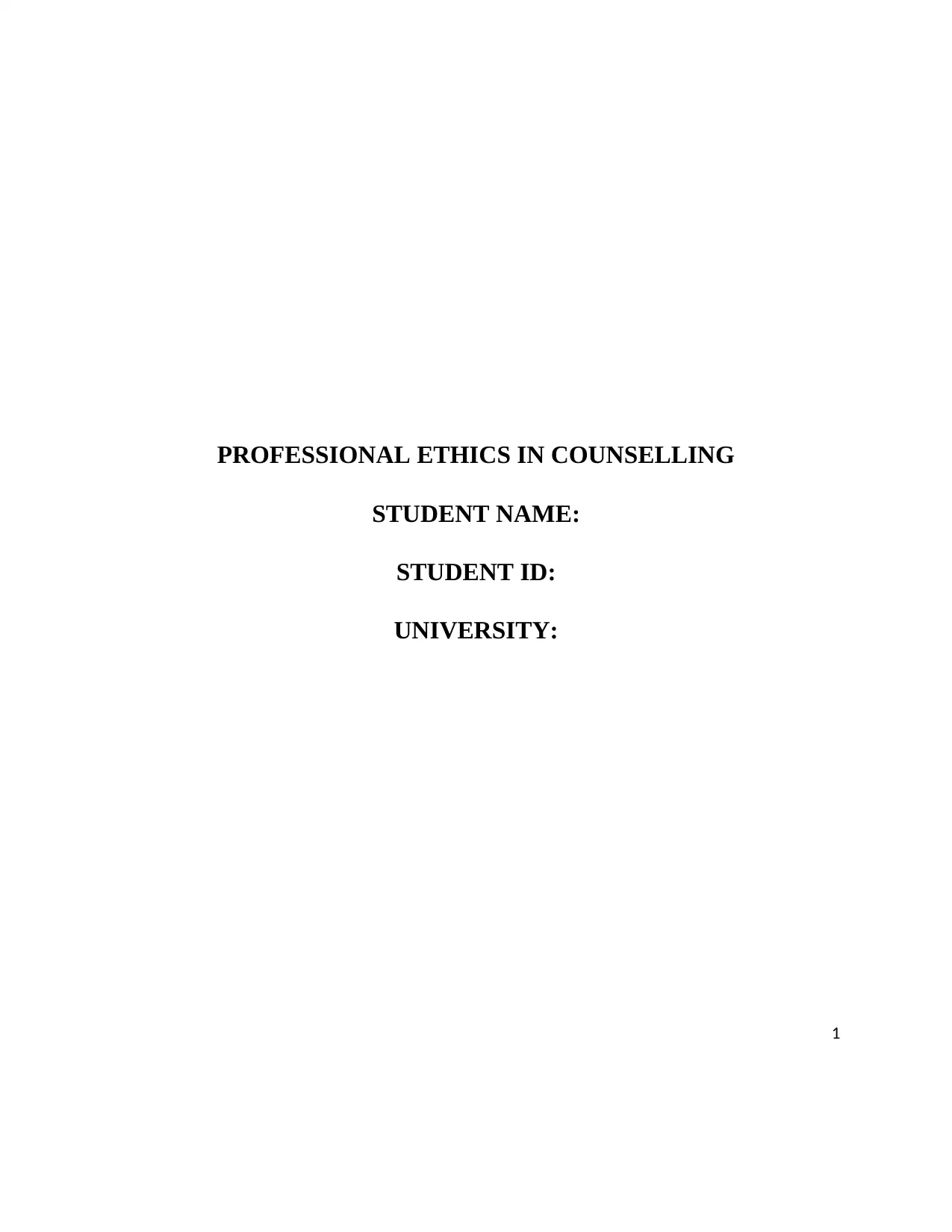
PROFESSIONAL ETHICS IN COUNSELLING
STUDENT NAME:
STUDENT ID:
UNIVERSITY:
1
STUDENT NAME:
STUDENT ID:
UNIVERSITY:
1
Paraphrase This Document
Need a fresh take? Get an instant paraphrase of this document with our AI Paraphraser
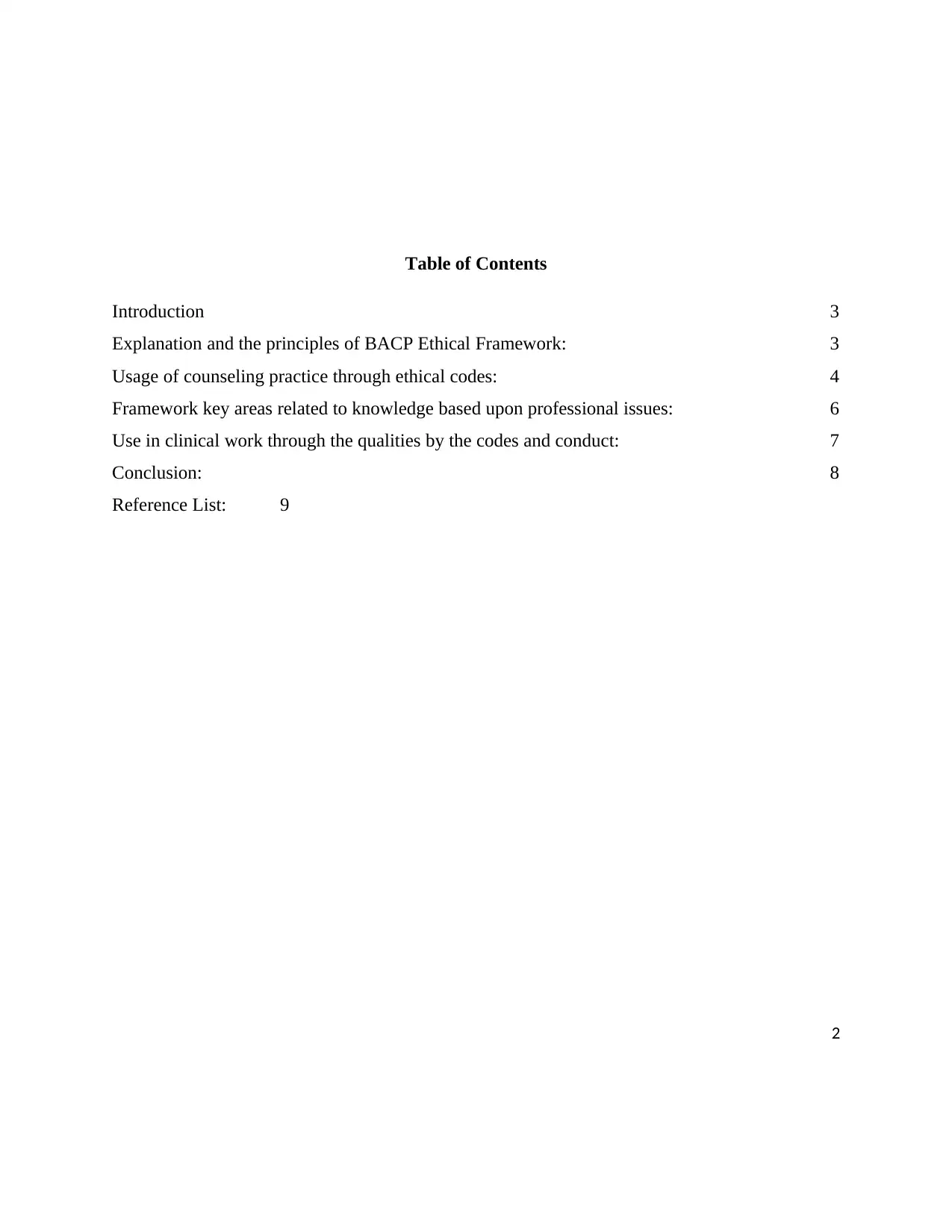
Table of Contents
Introduction 3
Explanation and the principles of BACP Ethical Framework: 3
Usage of counseling practice through ethical codes: 4
Framework key areas related to knowledge based upon professional issues: 6
Use in clinical work through the qualities by the codes and conduct: 7
Conclusion: 8
Reference List: 9
2
Introduction 3
Explanation and the principles of BACP Ethical Framework: 3
Usage of counseling practice through ethical codes: 4
Framework key areas related to knowledge based upon professional issues: 6
Use in clinical work through the qualities by the codes and conduct: 7
Conclusion: 8
Reference List: 9
2
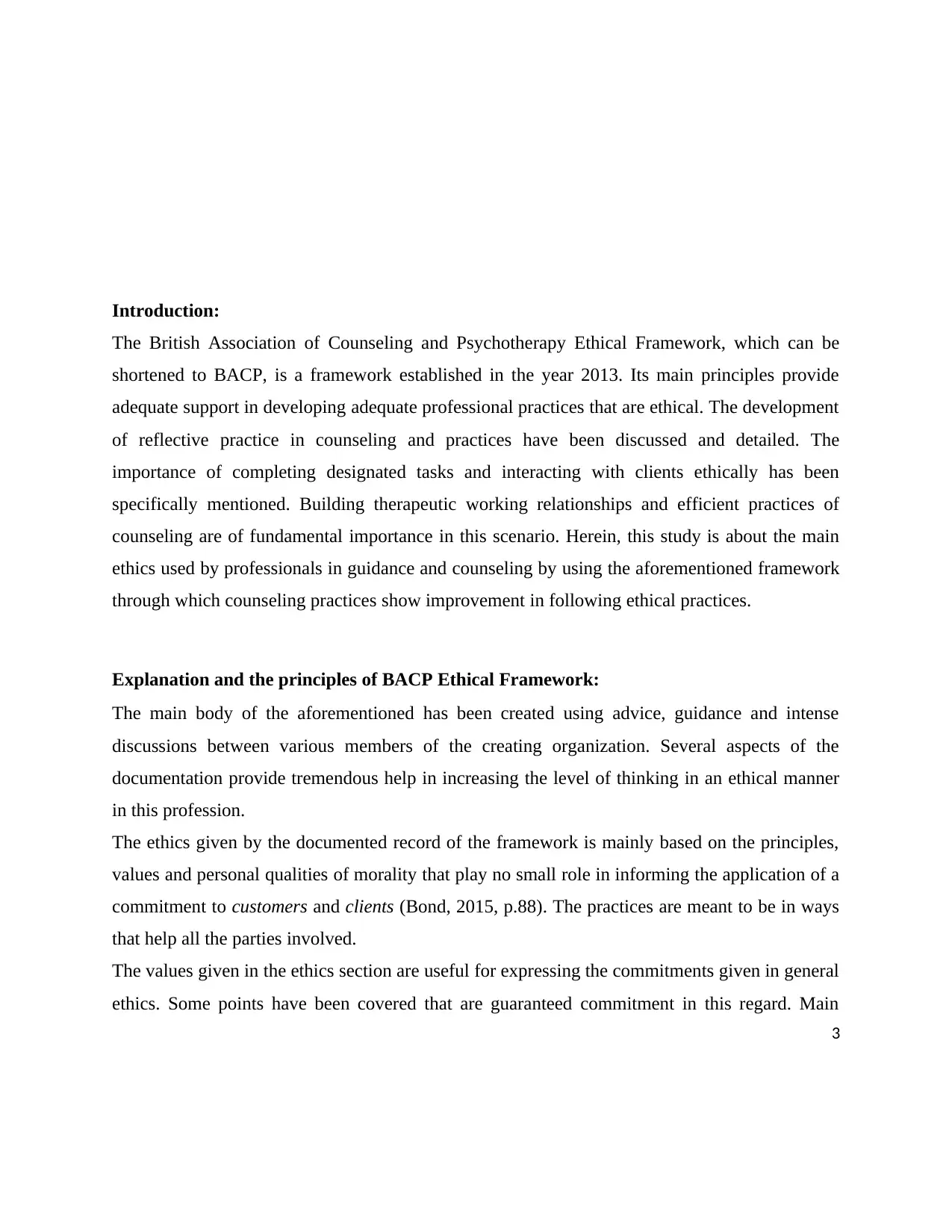
Introduction:
The British Association of Counseling and Psychotherapy Ethical Framework, which can be
shortened to BACP, is a framework established in the year 2013. Its main principles provide
adequate support in developing adequate professional practices that are ethical. The development
of reflective practice in counseling and practices have been discussed and detailed. The
importance of completing designated tasks and interacting with clients ethically has been
specifically mentioned. Building therapeutic working relationships and efficient practices of
counseling are of fundamental importance in this scenario. Herein, this study is about the main
ethics used by professionals in guidance and counseling by using the aforementioned framework
through which counseling practices show improvement in following ethical practices.
Explanation and the principles of BACP Ethical Framework:
The main body of the aforementioned has been created using advice, guidance and intense
discussions between various members of the creating organization. Several aspects of the
documentation provide tremendous help in increasing the level of thinking in an ethical manner
in this profession.
The ethics given by the documented record of the framework is mainly based on the principles,
values and personal qualities of morality that play no small role in informing the application of a
commitment to customers and clients (Bond, 2015, p.88). The practices are meant to be in ways
that help all the parties involved.
The values given in the ethics section are useful for expressing the commitments given in general
ethics. Some points have been covered that are guaranteed commitment in this regard. Main
3
The British Association of Counseling and Psychotherapy Ethical Framework, which can be
shortened to BACP, is a framework established in the year 2013. Its main principles provide
adequate support in developing adequate professional practices that are ethical. The development
of reflective practice in counseling and practices have been discussed and detailed. The
importance of completing designated tasks and interacting with clients ethically has been
specifically mentioned. Building therapeutic working relationships and efficient practices of
counseling are of fundamental importance in this scenario. Herein, this study is about the main
ethics used by professionals in guidance and counseling by using the aforementioned framework
through which counseling practices show improvement in following ethical practices.
Explanation and the principles of BACP Ethical Framework:
The main body of the aforementioned has been created using advice, guidance and intense
discussions between various members of the creating organization. Several aspects of the
documentation provide tremendous help in increasing the level of thinking in an ethical manner
in this profession.
The ethics given by the documented record of the framework is mainly based on the principles,
values and personal qualities of morality that play no small role in informing the application of a
commitment to customers and clients (Bond, 2015, p.88). The practices are meant to be in ways
that help all the parties involved.
The values given in the ethics section are useful for expressing the commitments given in general
ethics. Some points have been covered that are guaranteed commitment in this regard. Main
3
⊘ This is a preview!⊘
Do you want full access?
Subscribe today to unlock all pages.

Trusted by 1+ million students worldwide
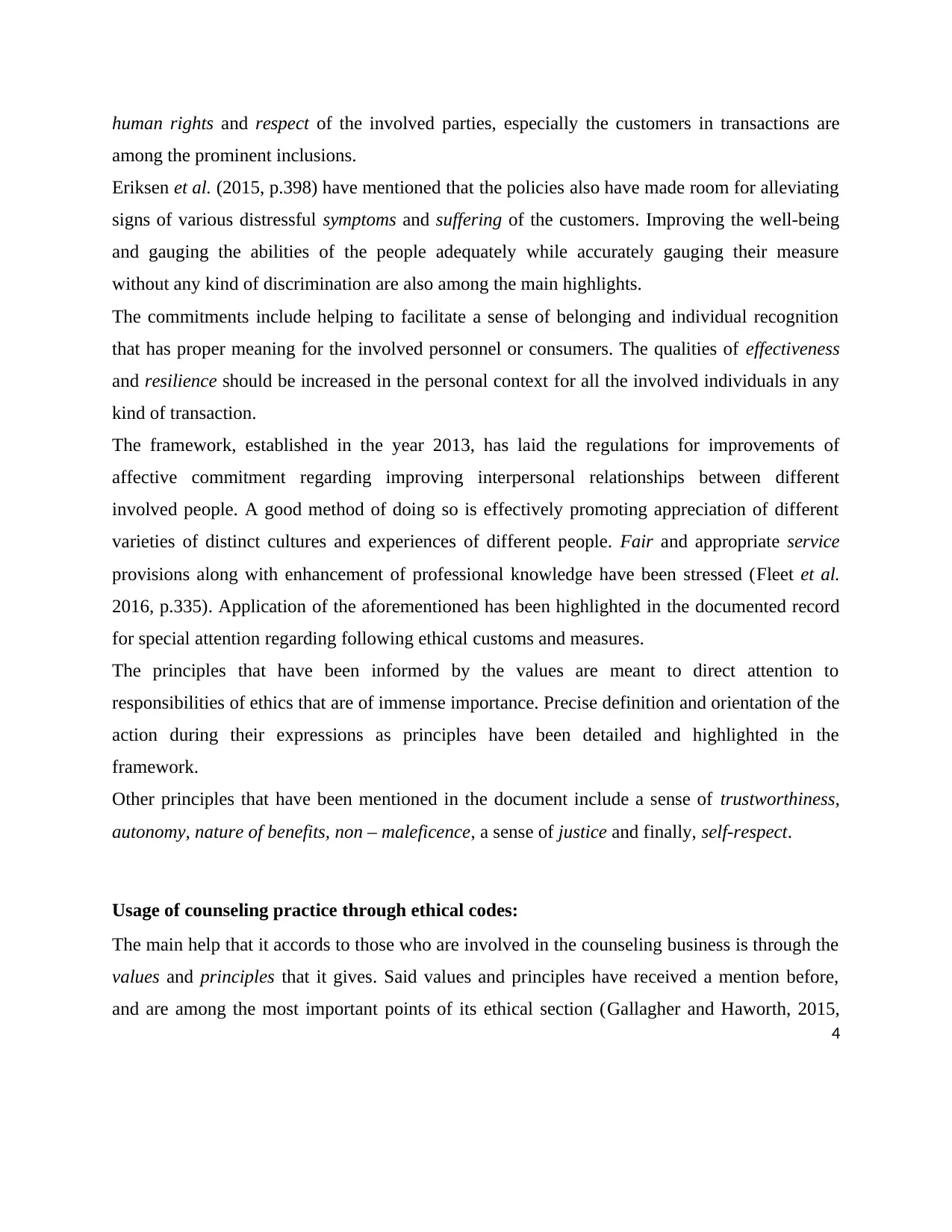
human rights and respect of the involved parties, especially the customers in transactions are
among the prominent inclusions.
Eriksen et al. (2015, p.398) have mentioned that the policies also have made room for alleviating
signs of various distressful symptoms and suffering of the customers. Improving the well-being
and gauging the abilities of the people adequately while accurately gauging their measure
without any kind of discrimination are also among the main highlights.
The commitments include helping to facilitate a sense of belonging and individual recognition
that has proper meaning for the involved personnel or consumers. The qualities of effectiveness
and resilience should be increased in the personal context for all the involved individuals in any
kind of transaction.
The framework, established in the year 2013, has laid the regulations for improvements of
affective commitment regarding improving interpersonal relationships between different
involved people. A good method of doing so is effectively promoting appreciation of different
varieties of distinct cultures and experiences of different people. Fair and appropriate service
provisions along with enhancement of professional knowledge have been stressed (Fleet et al.
2016, p.335). Application of the aforementioned has been highlighted in the documented record
for special attention regarding following ethical customs and measures.
The principles that have been informed by the values are meant to direct attention to
responsibilities of ethics that are of immense importance. Precise definition and orientation of the
action during their expressions as principles have been detailed and highlighted in the
framework.
Other principles that have been mentioned in the document include a sense of trustworthiness,
autonomy, nature of benefits, non – maleficence, a sense of justice and finally, self-respect.
Usage of counseling practice through ethical codes:
The main help that it accords to those who are involved in the counseling business is through the
values and principles that it gives. Said values and principles have received a mention before,
and are among the most important points of its ethical section (Gallagher and Haworth, 2015,
4
among the prominent inclusions.
Eriksen et al. (2015, p.398) have mentioned that the policies also have made room for alleviating
signs of various distressful symptoms and suffering of the customers. Improving the well-being
and gauging the abilities of the people adequately while accurately gauging their measure
without any kind of discrimination are also among the main highlights.
The commitments include helping to facilitate a sense of belonging and individual recognition
that has proper meaning for the involved personnel or consumers. The qualities of effectiveness
and resilience should be increased in the personal context for all the involved individuals in any
kind of transaction.
The framework, established in the year 2013, has laid the regulations for improvements of
affective commitment regarding improving interpersonal relationships between different
involved people. A good method of doing so is effectively promoting appreciation of different
varieties of distinct cultures and experiences of different people. Fair and appropriate service
provisions along with enhancement of professional knowledge have been stressed (Fleet et al.
2016, p.335). Application of the aforementioned has been highlighted in the documented record
for special attention regarding following ethical customs and measures.
The principles that have been informed by the values are meant to direct attention to
responsibilities of ethics that are of immense importance. Precise definition and orientation of the
action during their expressions as principles have been detailed and highlighted in the
framework.
Other principles that have been mentioned in the document include a sense of trustworthiness,
autonomy, nature of benefits, non – maleficence, a sense of justice and finally, self-respect.
Usage of counseling practice through ethical codes:
The main help that it accords to those who are involved in the counseling business is through the
values and principles that it gives. Said values and principles have received a mention before,
and are among the most important points of its ethical section (Gallagher and Haworth, 2015,
4
Paraphrase This Document
Need a fresh take? Get an instant paraphrase of this document with our AI Paraphraser
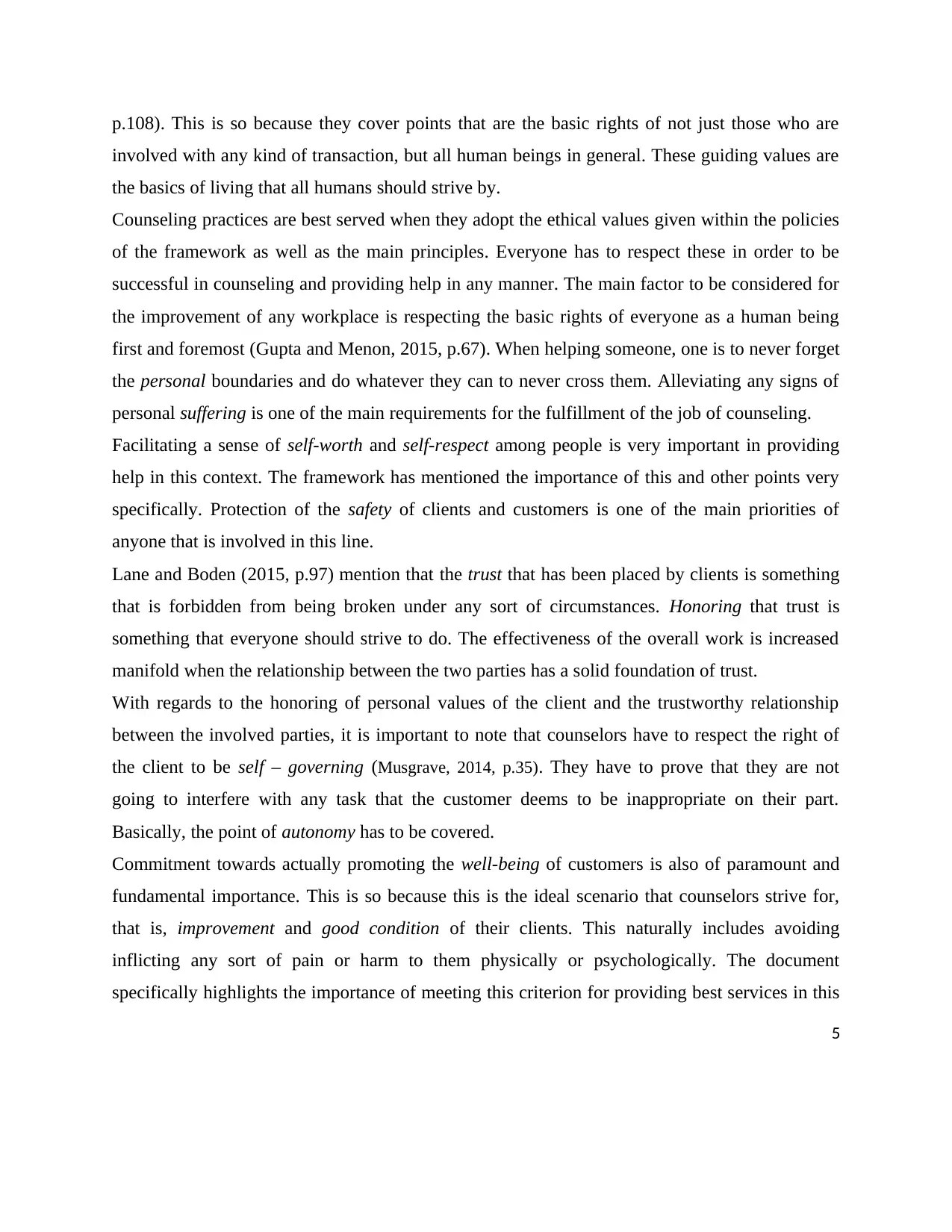
p.108). This is so because they cover points that are the basic rights of not just those who are
involved with any kind of transaction, but all human beings in general. These guiding values are
the basics of living that all humans should strive by.
Counseling practices are best served when they adopt the ethical values given within the policies
of the framework as well as the main principles. Everyone has to respect these in order to be
successful in counseling and providing help in any manner. The main factor to be considered for
the improvement of any workplace is respecting the basic rights of everyone as a human being
first and foremost (Gupta and Menon, 2015, p.67). When helping someone, one is to never forget
the personal boundaries and do whatever they can to never cross them. Alleviating any signs of
personal suffering is one of the main requirements for the fulfillment of the job of counseling.
Facilitating a sense of self-worth and self-respect among people is very important in providing
help in this context. The framework has mentioned the importance of this and other points very
specifically. Protection of the safety of clients and customers is one of the main priorities of
anyone that is involved in this line.
Lane and Boden (2015, p.97) mention that the trust that has been placed by clients is something
that is forbidden from being broken under any sort of circumstances. Honoring that trust is
something that everyone should strive to do. The effectiveness of the overall work is increased
manifold when the relationship between the two parties has a solid foundation of trust.
With regards to the honoring of personal values of the client and the trustworthy relationship
between the involved parties, it is important to note that counselors have to respect the right of
the client to be self – governing (Musgrave, 2014, p.35). They have to prove that they are not
going to interfere with any task that the customer deems to be inappropriate on their part.
Basically, the point of autonomy has to be covered.
Commitment towards actually promoting the well-being of customers is also of paramount and
fundamental importance. This is so because this is the ideal scenario that counselors strive for,
that is, improvement and good condition of their clients. This naturally includes avoiding
inflicting any sort of pain or harm to them physically or psychologically. The document
specifically highlights the importance of meeting this criterion for providing best services in this
5
involved with any kind of transaction, but all human beings in general. These guiding values are
the basics of living that all humans should strive by.
Counseling practices are best served when they adopt the ethical values given within the policies
of the framework as well as the main principles. Everyone has to respect these in order to be
successful in counseling and providing help in any manner. The main factor to be considered for
the improvement of any workplace is respecting the basic rights of everyone as a human being
first and foremost (Gupta and Menon, 2015, p.67). When helping someone, one is to never forget
the personal boundaries and do whatever they can to never cross them. Alleviating any signs of
personal suffering is one of the main requirements for the fulfillment of the job of counseling.
Facilitating a sense of self-worth and self-respect among people is very important in providing
help in this context. The framework has mentioned the importance of this and other points very
specifically. Protection of the safety of clients and customers is one of the main priorities of
anyone that is involved in this line.
Lane and Boden (2015, p.97) mention that the trust that has been placed by clients is something
that is forbidden from being broken under any sort of circumstances. Honoring that trust is
something that everyone should strive to do. The effectiveness of the overall work is increased
manifold when the relationship between the two parties has a solid foundation of trust.
With regards to the honoring of personal values of the client and the trustworthy relationship
between the involved parties, it is important to note that counselors have to respect the right of
the client to be self – governing (Musgrave, 2014, p.35). They have to prove that they are not
going to interfere with any task that the customer deems to be inappropriate on their part.
Basically, the point of autonomy has to be covered.
Commitment towards actually promoting the well-being of customers is also of paramount and
fundamental importance. This is so because this is the ideal scenario that counselors strive for,
that is, improvement and good condition of their clients. This naturally includes avoiding
inflicting any sort of pain or harm to them physically or psychologically. The document
specifically highlights the importance of meeting this criterion for providing best services in this
5
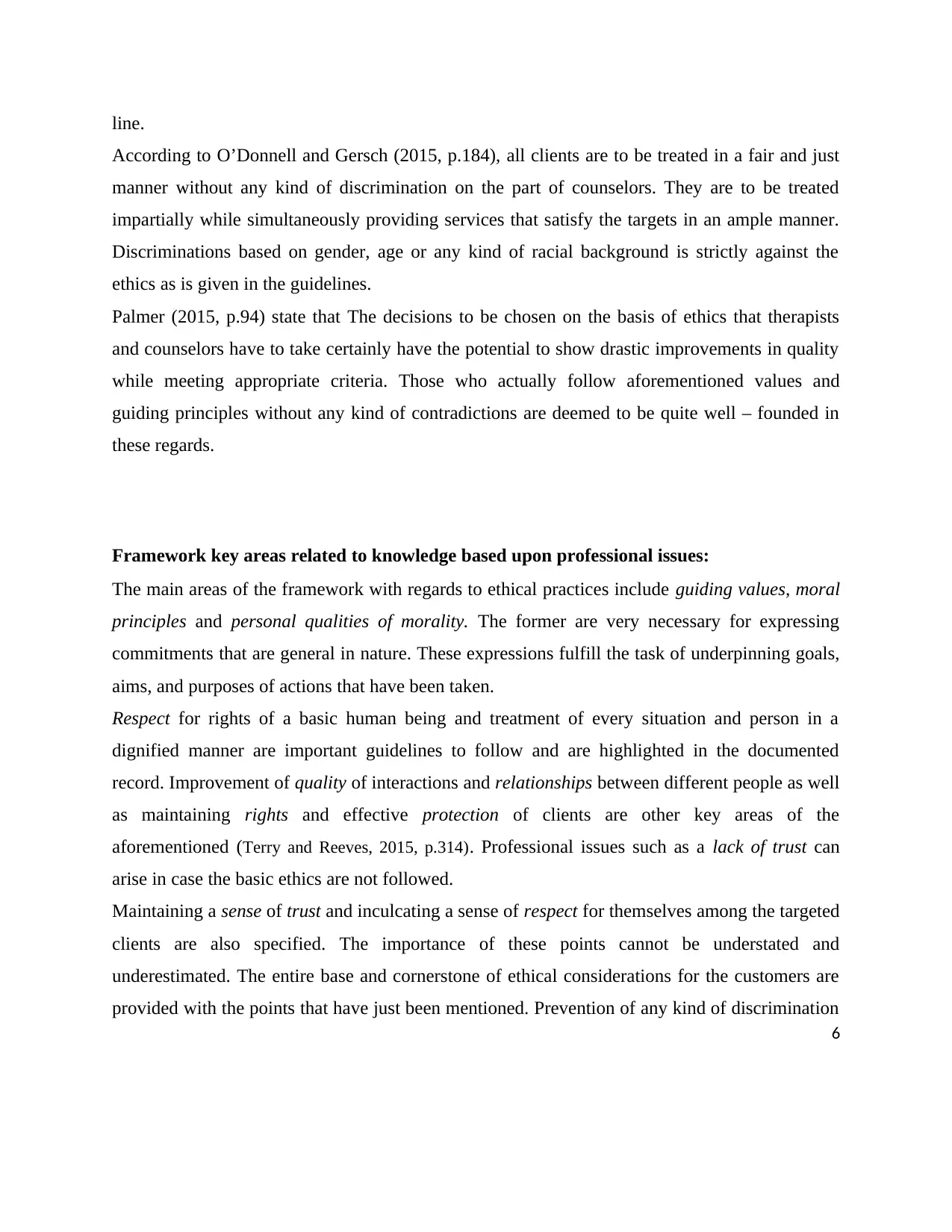
line.
According to O’Donnell and Gersch (2015, p.184), all clients are to be treated in a fair and just
manner without any kind of discrimination on the part of counselors. They are to be treated
impartially while simultaneously providing services that satisfy the targets in an ample manner.
Discriminations based on gender, age or any kind of racial background is strictly against the
ethics as is given in the guidelines.
Palmer (2015, p.94) state that The decisions to be chosen on the basis of ethics that therapists
and counselors have to take certainly have the potential to show drastic improvements in quality
while meeting appropriate criteria. Those who actually follow aforementioned values and
guiding principles without any kind of contradictions are deemed to be quite well – founded in
these regards.
Framework key areas related to knowledge based upon professional issues:
The main areas of the framework with regards to ethical practices include guiding values, moral
principles and personal qualities of morality. The former are very necessary for expressing
commitments that are general in nature. These expressions fulfill the task of underpinning goals,
aims, and purposes of actions that have been taken.
Respect for rights of a basic human being and treatment of every situation and person in a
dignified manner are important guidelines to follow and are highlighted in the documented
record. Improvement of quality of interactions and relationships between different people as well
as maintaining rights and effective protection of clients are other key areas of the
aforementioned (Terry and Reeves, 2015, p.314). Professional issues such as a lack of trust can
arise in case the basic ethics are not followed.
Maintaining a sense of trust and inculcating a sense of respect for themselves among the targeted
clients are also specified. The importance of these points cannot be understated and
underestimated. The entire base and cornerstone of ethical considerations for the customers are
provided with the points that have just been mentioned. Prevention of any kind of discrimination
6
According to O’Donnell and Gersch (2015, p.184), all clients are to be treated in a fair and just
manner without any kind of discrimination on the part of counselors. They are to be treated
impartially while simultaneously providing services that satisfy the targets in an ample manner.
Discriminations based on gender, age or any kind of racial background is strictly against the
ethics as is given in the guidelines.
Palmer (2015, p.94) state that The decisions to be chosen on the basis of ethics that therapists
and counselors have to take certainly have the potential to show drastic improvements in quality
while meeting appropriate criteria. Those who actually follow aforementioned values and
guiding principles without any kind of contradictions are deemed to be quite well – founded in
these regards.
Framework key areas related to knowledge based upon professional issues:
The main areas of the framework with regards to ethical practices include guiding values, moral
principles and personal qualities of morality. The former are very necessary for expressing
commitments that are general in nature. These expressions fulfill the task of underpinning goals,
aims, and purposes of actions that have been taken.
Respect for rights of a basic human being and treatment of every situation and person in a
dignified manner are important guidelines to follow and are highlighted in the documented
record. Improvement of quality of interactions and relationships between different people as well
as maintaining rights and effective protection of clients are other key areas of the
aforementioned (Terry and Reeves, 2015, p.314). Professional issues such as a lack of trust can
arise in case the basic ethics are not followed.
Maintaining a sense of trust and inculcating a sense of respect for themselves among the targeted
clients are also specified. The importance of these points cannot be understated and
underestimated. The entire base and cornerstone of ethical considerations for the customers are
provided with the points that have just been mentioned. Prevention of any kind of discrimination
6
⊘ This is a preview!⊘
Do you want full access?
Subscribe today to unlock all pages.

Trusted by 1+ million students worldwide
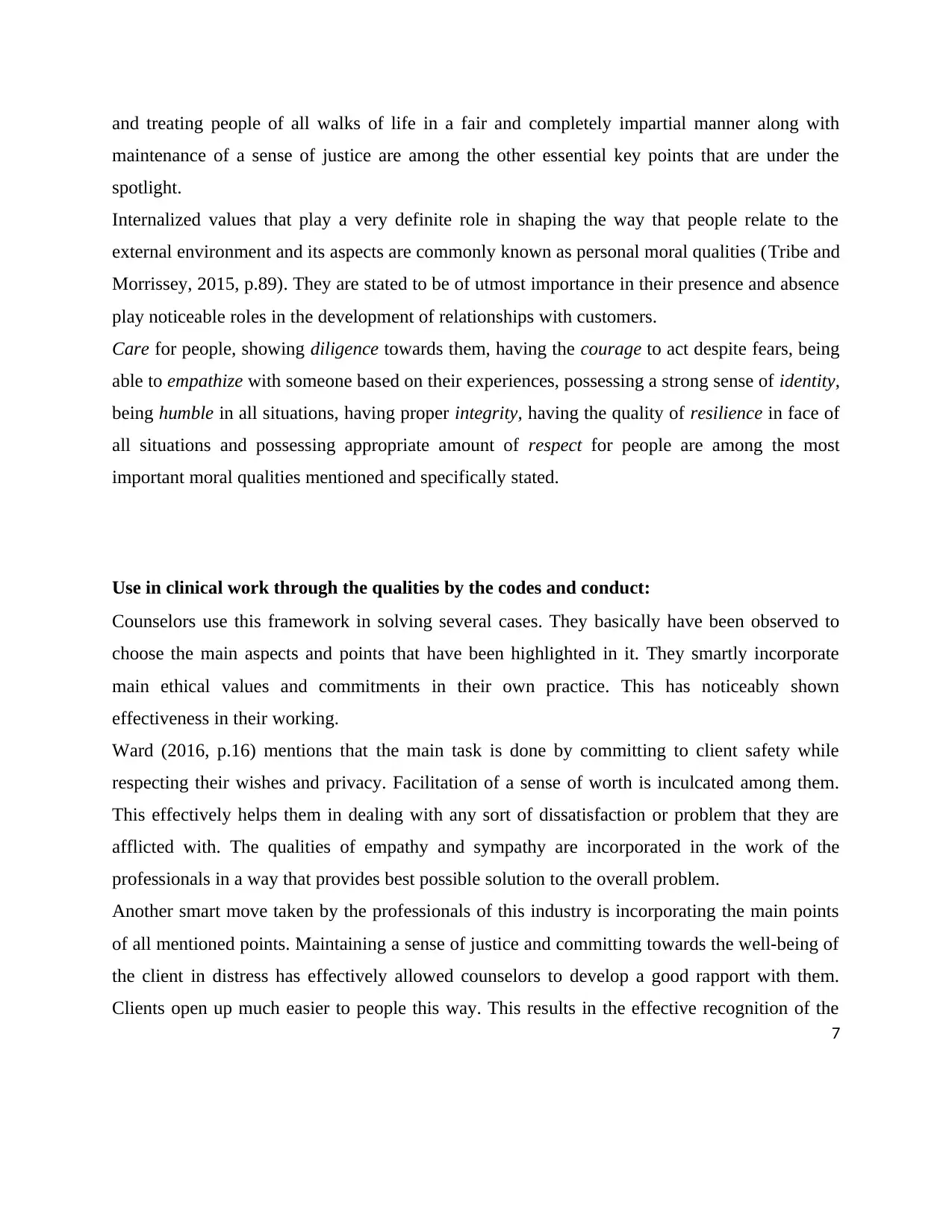
and treating people of all walks of life in a fair and completely impartial manner along with
maintenance of a sense of justice are among the other essential key points that are under the
spotlight.
Internalized values that play a very definite role in shaping the way that people relate to the
external environment and its aspects are commonly known as personal moral qualities (Tribe and
Morrissey, 2015, p.89). They are stated to be of utmost importance in their presence and absence
play noticeable roles in the development of relationships with customers.
Care for people, showing diligence towards them, having the courage to act despite fears, being
able to empathize with someone based on their experiences, possessing a strong sense of identity,
being humble in all situations, having proper integrity, having the quality of resilience in face of
all situations and possessing appropriate amount of respect for people are among the most
important moral qualities mentioned and specifically stated.
Use in clinical work through the qualities by the codes and conduct:
Counselors use this framework in solving several cases. They basically have been observed to
choose the main aspects and points that have been highlighted in it. They smartly incorporate
main ethical values and commitments in their own practice. This has noticeably shown
effectiveness in their working.
Ward (2016, p.16) mentions that the main task is done by committing to client safety while
respecting their wishes and privacy. Facilitation of a sense of worth is inculcated among them.
This effectively helps them in dealing with any sort of dissatisfaction or problem that they are
afflicted with. The qualities of empathy and sympathy are incorporated in the work of the
professionals in a way that provides best possible solution to the overall problem.
Another smart move taken by the professionals of this industry is incorporating the main points
of all mentioned points. Maintaining a sense of justice and committing towards the well-being of
the client in distress has effectively allowed counselors to develop a good rapport with them.
Clients open up much easier to people this way. This results in the effective recognition of the
7
maintenance of a sense of justice are among the other essential key points that are under the
spotlight.
Internalized values that play a very definite role in shaping the way that people relate to the
external environment and its aspects are commonly known as personal moral qualities (Tribe and
Morrissey, 2015, p.89). They are stated to be of utmost importance in their presence and absence
play noticeable roles in the development of relationships with customers.
Care for people, showing diligence towards them, having the courage to act despite fears, being
able to empathize with someone based on their experiences, possessing a strong sense of identity,
being humble in all situations, having proper integrity, having the quality of resilience in face of
all situations and possessing appropriate amount of respect for people are among the most
important moral qualities mentioned and specifically stated.
Use in clinical work through the qualities by the codes and conduct:
Counselors use this framework in solving several cases. They basically have been observed to
choose the main aspects and points that have been highlighted in it. They smartly incorporate
main ethical values and commitments in their own practice. This has noticeably shown
effectiveness in their working.
Ward (2016, p.16) mentions that the main task is done by committing to client safety while
respecting their wishes and privacy. Facilitation of a sense of worth is inculcated among them.
This effectively helps them in dealing with any sort of dissatisfaction or problem that they are
afflicted with. The qualities of empathy and sympathy are incorporated in the work of the
professionals in a way that provides best possible solution to the overall problem.
Another smart move taken by the professionals of this industry is incorporating the main points
of all mentioned points. Maintaining a sense of justice and committing towards the well-being of
the client in distress has effectively allowed counselors to develop a good rapport with them.
Clients open up much easier to people this way. This results in the effective recognition of the
7
Paraphrase This Document
Need a fresh take? Get an instant paraphrase of this document with our AI Paraphraser
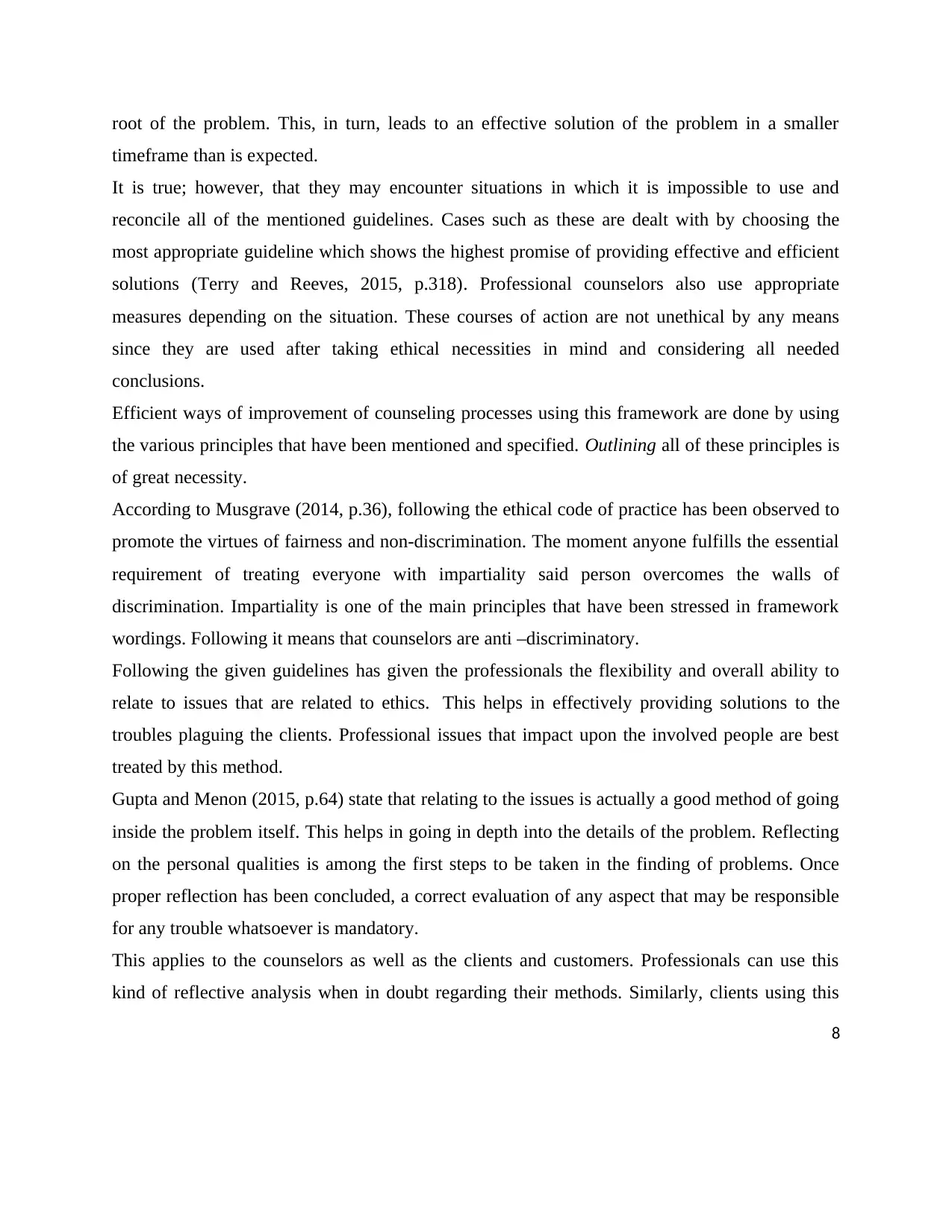
root of the problem. This, in turn, leads to an effective solution of the problem in a smaller
timeframe than is expected.
It is true; however, that they may encounter situations in which it is impossible to use and
reconcile all of the mentioned guidelines. Cases such as these are dealt with by choosing the
most appropriate guideline which shows the highest promise of providing effective and efficient
solutions (Terry and Reeves, 2015, p.318). Professional counselors also use appropriate
measures depending on the situation. These courses of action are not unethical by any means
since they are used after taking ethical necessities in mind and considering all needed
conclusions.
Efficient ways of improvement of counseling processes using this framework are done by using
the various principles that have been mentioned and specified. Outlining all of these principles is
of great necessity.
According to Musgrave (2014, p.36), following the ethical code of practice has been observed to
promote the virtues of fairness and non-discrimination. The moment anyone fulfills the essential
requirement of treating everyone with impartiality said person overcomes the walls of
discrimination. Impartiality is one of the main principles that have been stressed in framework
wordings. Following it means that counselors are anti –discriminatory.
Following the given guidelines has given the professionals the flexibility and overall ability to
relate to issues that are related to ethics. This helps in effectively providing solutions to the
troubles plaguing the clients. Professional issues that impact upon the involved people are best
treated by this method.
Gupta and Menon (2015, p.64) state that relating to the issues is actually a good method of going
inside the problem itself. This helps in going in depth into the details of the problem. Reflecting
on the personal qualities is among the first steps to be taken in the finding of problems. Once
proper reflection has been concluded, a correct evaluation of any aspect that may be responsible
for any trouble whatsoever is mandatory.
This applies to the counselors as well as the clients and customers. Professionals can use this
kind of reflective analysis when in doubt regarding their methods. Similarly, clients using this
8
timeframe than is expected.
It is true; however, that they may encounter situations in which it is impossible to use and
reconcile all of the mentioned guidelines. Cases such as these are dealt with by choosing the
most appropriate guideline which shows the highest promise of providing effective and efficient
solutions (Terry and Reeves, 2015, p.318). Professional counselors also use appropriate
measures depending on the situation. These courses of action are not unethical by any means
since they are used after taking ethical necessities in mind and considering all needed
conclusions.
Efficient ways of improvement of counseling processes using this framework are done by using
the various principles that have been mentioned and specified. Outlining all of these principles is
of great necessity.
According to Musgrave (2014, p.36), following the ethical code of practice has been observed to
promote the virtues of fairness and non-discrimination. The moment anyone fulfills the essential
requirement of treating everyone with impartiality said person overcomes the walls of
discrimination. Impartiality is one of the main principles that have been stressed in framework
wordings. Following it means that counselors are anti –discriminatory.
Following the given guidelines has given the professionals the flexibility and overall ability to
relate to issues that are related to ethics. This helps in effectively providing solutions to the
troubles plaguing the clients. Professional issues that impact upon the involved people are best
treated by this method.
Gupta and Menon (2015, p.64) state that relating to the issues is actually a good method of going
inside the problem itself. This helps in going in depth into the details of the problem. Reflecting
on the personal qualities is among the first steps to be taken in the finding of problems. Once
proper reflection has been concluded, a correct evaluation of any aspect that may be responsible
for any trouble whatsoever is mandatory.
This applies to the counselors as well as the clients and customers. Professionals can use this
kind of reflective analysis when in doubt regarding their methods. Similarly, clients using this
8
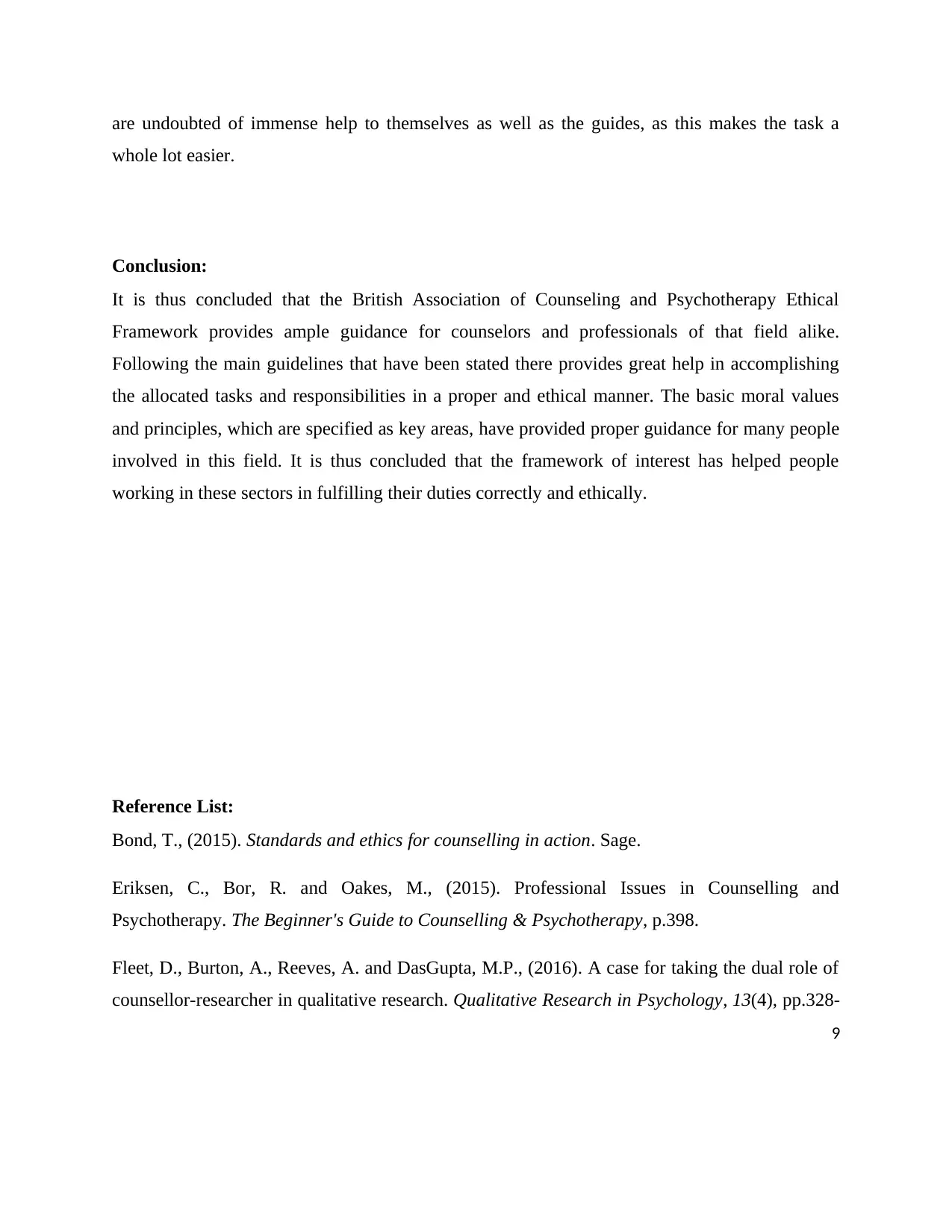
are undoubted of immense help to themselves as well as the guides, as this makes the task a
whole lot easier.
Conclusion:
It is thus concluded that the British Association of Counseling and Psychotherapy Ethical
Framework provides ample guidance for counselors and professionals of that field alike.
Following the main guidelines that have been stated there provides great help in accomplishing
the allocated tasks and responsibilities in a proper and ethical manner. The basic moral values
and principles, which are specified as key areas, have provided proper guidance for many people
involved in this field. It is thus concluded that the framework of interest has helped people
working in these sectors in fulfilling their duties correctly and ethically.
Reference List:
Bond, T., (2015). Standards and ethics for counselling in action. Sage.
Eriksen, C., Bor, R. and Oakes, M., (2015). Professional Issues in Counselling and
Psychotherapy. The Beginner's Guide to Counselling & Psychotherapy, p.398.
Fleet, D., Burton, A., Reeves, A. and DasGupta, M.P., (2016). A case for taking the dual role of
counsellor-researcher in qualitative research. Qualitative Research in Psychology, 13(4), pp.328-
9
whole lot easier.
Conclusion:
It is thus concluded that the British Association of Counseling and Psychotherapy Ethical
Framework provides ample guidance for counselors and professionals of that field alike.
Following the main guidelines that have been stated there provides great help in accomplishing
the allocated tasks and responsibilities in a proper and ethical manner. The basic moral values
and principles, which are specified as key areas, have provided proper guidance for many people
involved in this field. It is thus concluded that the framework of interest has helped people
working in these sectors in fulfilling their duties correctly and ethically.
Reference List:
Bond, T., (2015). Standards and ethics for counselling in action. Sage.
Eriksen, C., Bor, R. and Oakes, M., (2015). Professional Issues in Counselling and
Psychotherapy. The Beginner's Guide to Counselling & Psychotherapy, p.398.
Fleet, D., Burton, A., Reeves, A. and DasGupta, M.P., (2016). A case for taking the dual role of
counsellor-researcher in qualitative research. Qualitative Research in Psychology, 13(4), pp.328-
9
⊘ This is a preview!⊘
Do you want full access?
Subscribe today to unlock all pages.

Trusted by 1+ million students worldwide
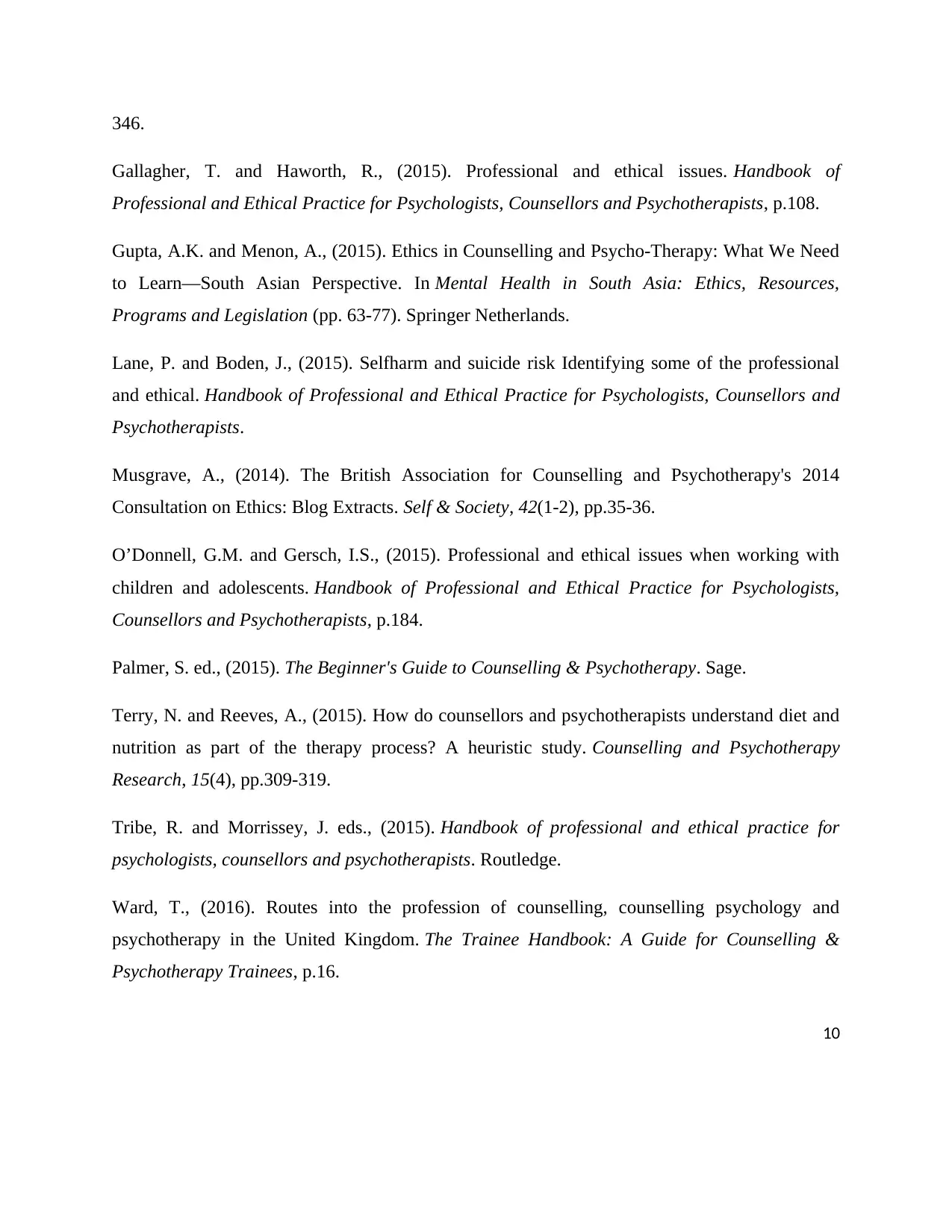
346.
Gallagher, T. and Haworth, R., (2015). Professional and ethical issues. Handbook of
Professional and Ethical Practice for Psychologists, Counsellors and Psychotherapists, p.108.
Gupta, A.K. and Menon, A., (2015). Ethics in Counselling and Psycho-Therapy: What We Need
to Learn—South Asian Perspective. In Mental Health in South Asia: Ethics, Resources,
Programs and Legislation (pp. 63-77). Springer Netherlands.
Lane, P. and Boden, J., (2015). Selfharm and suicide risk Identifying some of the professional
and ethical. Handbook of Professional and Ethical Practice for Psychologists, Counsellors and
Psychotherapists.
Musgrave, A., (2014). The British Association for Counselling and Psychotherapy's 2014
Consultation on Ethics: Blog Extracts. Self & Society, 42(1-2), pp.35-36.
O’Donnell, G.M. and Gersch, I.S., (2015). Professional and ethical issues when working with
children and adolescents. Handbook of Professional and Ethical Practice for Psychologists,
Counsellors and Psychotherapists, p.184.
Palmer, S. ed., (2015). The Beginner's Guide to Counselling & Psychotherapy. Sage.
Terry, N. and Reeves, A., (2015). How do counsellors and psychotherapists understand diet and
nutrition as part of the therapy process? A heuristic study. Counselling and Psychotherapy
Research, 15(4), pp.309-319.
Tribe, R. and Morrissey, J. eds., (2015). Handbook of professional and ethical practice for
psychologists, counsellors and psychotherapists. Routledge.
Ward, T., (2016). Routes into the profession of counselling, counselling psychology and
psychotherapy in the United Kingdom. The Trainee Handbook: A Guide for Counselling &
Psychotherapy Trainees, p.16.
10
Gallagher, T. and Haworth, R., (2015). Professional and ethical issues. Handbook of
Professional and Ethical Practice for Psychologists, Counsellors and Psychotherapists, p.108.
Gupta, A.K. and Menon, A., (2015). Ethics in Counselling and Psycho-Therapy: What We Need
to Learn—South Asian Perspective. In Mental Health in South Asia: Ethics, Resources,
Programs and Legislation (pp. 63-77). Springer Netherlands.
Lane, P. and Boden, J., (2015). Selfharm and suicide risk Identifying some of the professional
and ethical. Handbook of Professional and Ethical Practice for Psychologists, Counsellors and
Psychotherapists.
Musgrave, A., (2014). The British Association for Counselling and Psychotherapy's 2014
Consultation on Ethics: Blog Extracts. Self & Society, 42(1-2), pp.35-36.
O’Donnell, G.M. and Gersch, I.S., (2015). Professional and ethical issues when working with
children and adolescents. Handbook of Professional and Ethical Practice for Psychologists,
Counsellors and Psychotherapists, p.184.
Palmer, S. ed., (2015). The Beginner's Guide to Counselling & Psychotherapy. Sage.
Terry, N. and Reeves, A., (2015). How do counsellors and psychotherapists understand diet and
nutrition as part of the therapy process? A heuristic study. Counselling and Psychotherapy
Research, 15(4), pp.309-319.
Tribe, R. and Morrissey, J. eds., (2015). Handbook of professional and ethical practice for
psychologists, counsellors and psychotherapists. Routledge.
Ward, T., (2016). Routes into the profession of counselling, counselling psychology and
psychotherapy in the United Kingdom. The Trainee Handbook: A Guide for Counselling &
Psychotherapy Trainees, p.16.
10
Paraphrase This Document
Need a fresh take? Get an instant paraphrase of this document with our AI Paraphraser

11
1 out of 11
Related Documents
Your All-in-One AI-Powered Toolkit for Academic Success.
+13062052269
info@desklib.com
Available 24*7 on WhatsApp / Email
![[object Object]](/_next/static/media/star-bottom.7253800d.svg)
Unlock your academic potential
Copyright © 2020–2026 A2Z Services. All Rights Reserved. Developed and managed by ZUCOL.




